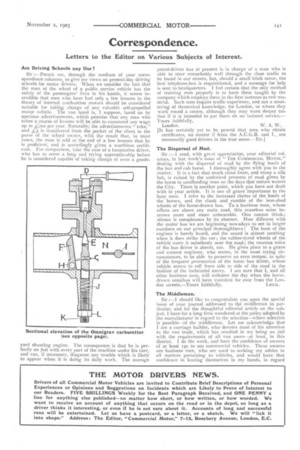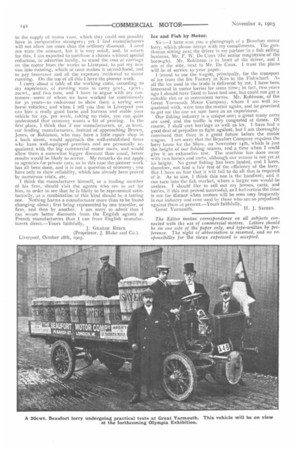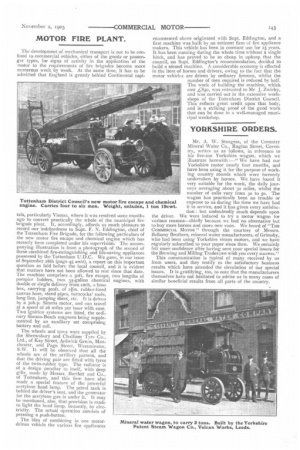Correspondence.
Page 19

Page 20

Page 21

If you've noticed an error in this article please click here to report it so we can fix it.
Sir :—Permit me, through the medium of your correspondence columns, to give my views on present-day driving schools for motor drivers. When we consider the fact that the man at the wheel of a public service vehicle has the safety of the passengers lives in his hands, it seems incredible that men who have had only a few lessons in the theory of internal combustion motors should be considered suitable for taking charge of any valuable self-propelled motor vehicle. The van hand is, I suppose, lured on by specious advertisements, which promise that any man who takes a course of lessons will be able to command any wage up to £200 per year. Naturally; the advertisements " take," and 1;5 is transferred from the pocket of the client to the purse of the school owner, with the result that, in most cases, the man is told at the end of a few lessons that he is proficient, and is accordingly given a worthless certificate. For comparison, take the case of a locomotive driver, who has to serve a long and trying apprenticeship before he is considered capable of taking charge of even a goods yard shunting engine, The consequence is that he is perfectly au fait with every part of the machine under his care, and can, if necessary, diagnose any trouble which is likely to appear when it is doing its daily work. The average petrol-driven bus at present is in charge of a man who is able to steer remarkably well through the close traftic to be found in our streets, but, should a small hitch occur, the first telephone-box is requisitioned, and a message for help is sent to headquarters. I feel certain that the only method of training men properly is to have them taught by the company which employs the in in the first instance as raw material. Such men require traffic experience, and not a smattering of theoretical knowledge, for London, or where they work round a centre, although they may want deeper tuition if it is intended to put them on an isolated service.— Yours faithfully, London. W. A, W. [It has certainly yet to be proved that men who obtain certificates, no matter if from the A.C.G.B. and I., are necessarily good drivers in the true sense.—En.]
The Dispersal of Mud.
Sir :—I read, with great appreciation, your editorial columns, in last week's issue of "THE COMMERCIAL MOTOR," dealing with the dispersal of mud by the flying hoofs of the bus and cab horse. I thoroughly agree with you in the matter. It is a fact that much clean linen, and many a silk hat, is ruined by the undesired presents of mud given by the horse to unoffending man on the days that nature waters the City. There is another point, which you have not dealt with in your article. It is one of grave importance to the busy man. I refer to the incessant clatter of the hoofs of the horses, and the clank and rumble of the iron-shod wheels of the horse-drawn bus. To a business man, whose offices are above any main road, this ceaseless noise becomes more and more unbearable. One cannot think; silence is conspicuous by its absence. How different with the motor bus we are beginning nowadays to see in larger numbers on our principal thoroughfares! The hum of the engines is barely heard, and the sound is almost soothing when it does strike the ear ; the rubber-tyred wheels of the vehicle carry it noiselessly over the road; the raucous voice of the bus driver is absent, too. He gives place to a grave and earnest engineer, who seems, in the most trying circumstances, to be able to preserve an even temper, in spite of the frequent provocation of the horse bus driver, whose vehicle seems to roll from side to side of the road in the fashion of the inebriated navvy. I am sure that I, and all other business men, will welcome the day when the horsedrawn omnibus will have vanished for ever from the Lon don streets.—Yours faithfully, LEGAL.
The Middleman.
Sir :—I should like to congratulate you upon the special issue of your journal addressed to the iniddleman in particular, and for the thoughtful editorial article on the subject. I have for a long time wondered at the policy adopted by the manufacturer in regard to the selection—where selection is possible—of the middleman. Let me acknowledge that I am a carriage builder, who devotes most of his attention to the van trade, which has resulted in my being au t fait with the requirements of all van users—at least, in this district. I do the work, and have the confidence of owners of at least iso to 200 commercial vehicles. These owners are business men, who are used to seeking my advice in all matters pertaining to vehicles, and would have that confidence in leaving themselves in my hands, in regard
to the supply of motor vans, which they could not possibly have in comparative strangers; yet I find manufacturers will not allow me more than the ordinary discount. I need not state the amount, but it is very small, and, in return for this, I am expected to purchase a chassis without special reduction, to advertise locally, to stand the cost of carriage on the motor from the works LO Liverpool, to put my new van into running, which at once makes it second-hand, and to pay insurance and all the expenses incidental to motor running. On the top of all this I have the pioneer work. I carry about a table of the working costs, according to
my experience, of running vans to carry 5cwt., 15cwt., 20cwt., and two tons, and I have to argue with my customers—some of whom we have worked for continuously for 30 years—to endeavour to show them a saving over horse vehicles; and when I tell you that in Liverpool you can hire a really good horse and harness and stable your vehicle for 25s. per week, taking no risks, you can quite understand that economy wants a bit of proving. In the first place, I think that if our manufacturers, or, at least, our leading manufacturers, instead of approaching Brown, Jones, or Robinson, who may have a little repair shop in a back street, would approach the well-established firms who have well-equipped premises and are personally acquainted with the big commercial motor users, and would allow them a somewhat bigger discount than usual, better results would be likely to accrue. My remarks do not apply to agencies for private cars, as in this case the pioneer work has all been done, and it is not a question of economy ; you have only to show reliability, which has already been proved by numerous trials, etc.
I think the manufacturer himself, or a leading member of his firm, should visit the agents who are to act for him, in order to see that he is likely to be represented satisfactorily, as a combination of this kind should be a lasting one. othing harms a manufacturer more than to be found changing about ; first being represented by one traveller, or firm, and then by another. I am sorry to admit that I can secure better discounts from the English agents of French manufacturers than I can from English tnanufacturers direct.—Yours faithfully,
J. GRAHAM REECE
(Proprietor, J. Blake and Co.). Liverpool, October 28th, 1905. Ice and Fish by Motor.
Sir :—I have sent you a photograph of a Beaufort motor lorry, which please accept with my compliments. The gentleman sitting next the driver is my partner in a fish selling business, Mr. F. W. De Caux Pe senior magistrate of the borough). Mr. Robinson is in front of the driver, and I am at the side, next to Mr. De Caux. I trust the photo will be of service to your paper.
I intend to use the wagon, principally, for the transport of ice from the Ice Factory in Kits to the Fishwharf. As all the ice used in the trade is delivered by me, I have been interested in motor lorries for some time; in fact, two years ago I should have liked to have had one, but could not get a suitable size or at convenient terms. Mr. Robinson, of the Great Yarmouth Motor Company, whom I ani well acquainted with, went into the matter again, and he promised to get me the one we now have as an experiment.
Our fishing industry is a unique one; a great many carts are used, and the traffic is very congested at times. Of course, I shall cart herrings as well as ice. I have had a good deal of prejudice to fight against, but I am thoroughly convinced that there is a great future before the motor wagon. I am sorry that the Beaufort Company requires the lorry home for the Show, on November i4th, which is just the height of our fishing season, and a time when I could give it an exhaustive test. The machine has done away with two horses and carts, although our season is not yet at its height. No great fishing has been landed, and I have, therefore, not had a fair test of the efficiency of the lorry. But I have no fear that it will fail to do all that is required of it. As to size, I think this one is the handiest; and it can turn into the fish market, where a larger one would be useless. I should like to sell out my horses, carts, and lorries, if this test proved successful, as I feel certain the time is not far distant when motors will be seen very frequently in our industry and even used by those who are so prejudiced against them at present.—Yours faithfully,
Great Yarmouth. II. J. SAYERS.
The Editor invites correspondence on all subjects connected with the use of commercial motors. Letters should be on one side of the paper only, and type-written by preference. The right of abbreviation is reserved, and no responsibility for the views expressed is accepted.
MOTOR FIRE PLANT.
The development of mechanical transport is not to be confined to commercial vehicles, either of the goods or passenger types, for signs of activity in the application of the motor to the requirements of fire brigades become more numerous week by week. At the same time, it has to be admitted that England is greatly behind Continental capi tals, particularly Vienna, where it was resolved some months ago to convert practically the whole of the municipal fire brigade plant. It, accordingly, affords us much pleasure to record our indebtedness to Supt. F. N. Eddington, chief of the Tottenham Fire Brigade, for the following particulars of the new motor fire escape and chemical engine which has recently been completed under his supervision. The accompanying illustration is from a photograph of the second of these combined fire-extinguishing and life-saving appliances possessed by the Tottenham U.D.C. We gave, in our issue of September 28th (J)age 45 ante), a report on this important question as laid before the local council, and it is evident that matters have not been allowed to rest since that date. The machine comprises a soft. fire escape, two lengths of pompier ladders, two 35-gallon chemical engines, with double or single delivery from each, a hose box, carrying sooft. of 2fin. rubber-lined canvas hose, stand pipes, turncocks' tools, long line, jumping sheet, etc. it is driven by a 3oh.p. Simms motor, and can travel at a speed of 26 miles per hour with ease. Two ignition systems are fitted, the ordinary Simms-Bosch magneto being supplemented by an auxiliary set comprising battery and coil.
The wheels and tyres were supplied by the Shrewsbury and Challiner Tyre Co., Ltd., of Kay Street, Ardwick Green, Manchester, and Page Street, Westminster, S.W. It will be observed that all the wheels are of the artillery pattern, and that the driving pair are fitted with tyres of the twin-rubber type. The radiator is of a design peculiar to itself, with deep gills, made by Messrs. Bartlett and Co., of Tottenham, and this firm have also made a special feature of the powerful acetylene head lamp. The petrol tank is behind the driver's seat, and the generator for the acetylene gas is under it. It may be mentioned, also, that provision is made to light the head lamp, instantly, by electricity. The actual operation consists of pressing a push-button.
The idea of combining in one motordriven vehicle the various fire appliances
enumerated above originated with Supt. Edding-ton, and a first machine was built by an eminent firm of fire appliance makers. This vehicle has been in constant use for 2i years. It has been running during the whole time without a single hitch, and has proved to be so cheap in upkeep that the council, on Supt. Eddington's recommendation, decided to build a sdoond machine. A considerable economy is effected in the item of horses and drivers, owing to the fact that the motor vehicIts are driven by ordinary firemen, whilst the number of men required is reduced by half. The work of building the machine, which cost £850, was entrusted to Mr J. Zwicky, and was carried out in the extensive workshops of the Tottenham District Council. This reflects great credit upon that body, and is a striking proof of the good work that can be done in a well-managed municipal workshop.
YORKSHIRE ORDERS.
Mr. A. W. Sturgess, of the Coventry Mineral Water Co., Raglan Street, Coventry, writes us as follows, in reference to his five-ton Yorkshire wagon, which we illustrate herewith :—" We have had our Yorkshire motor nearly four months, and have been using it for the purpose of working country rounds which were formerly undertaken by horses. We have found it very suitable for the work, the daily journeys averaging about 30 miles, whilst the number of calls vary from 30 to so. The wagon has practically been no trouble or expense to us during the time we have had it in service, and it has given every satisfaction: but undoubtedly much depends upon the driver. We were induced to try a motor wagon for various reasons—chiefly because we had no alternative but to buy more horses and more new vans. We heard of "Tun COMMERCIAL MOTOR" through the courtesy of Messrs. Bellamy Brothers, mineral water manufacturers, of Grimsby, who had been using: Yorkshire steam motors, and we have regularly subscribed to your paper since then. We certainly felt more confidence after having seen your special issues for the Brewing and Milling Trades ;we wish you every success."
This communication is typical of many received by us from users, and they testify to the satisfactory business results which have attended the circulation of our special issues. It is gratifying, too, to note that the manufacturers themselves have not hesitated to advise us in many cases of similar beneficial results from all parts of the country.






















